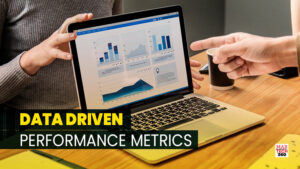Data-driven marketing or DDM looks at the many ways consumer behavior has changed in recent years. It mainly depends on the technologies that make the collecting and analyzing of massive amounts of data about customers, markets, and industries, easier. Data-driven marketing uses the most recent data analytics tools to identify the most effective media buys and to create creative and personalized brand awareness.
In today’s business environment which is now more uncertain than ever, understanding consumer behavior is an integral part of an organization’s strategic planning and execution process. It is the key driver for becoming a market leader making it important that all processes in business are made customer centric.
Marketers should seriously consider leveraging big data through data-driven marketing. It helps businesses in identifying the “ideal” customers, it is important to “keep” and “grow” them, and maintain growth and profitability. DDM adoption patterns determine how businesses should strive to maximize their growth by focusing on implementing “customer centricity.”
Data-driven marketing can help your business perform

Here’s how you can improve the integrity of your data in order to give customers a better experience in relation to the change in consumer attitude and behavior as well as the everyday problems organizations encounter.
-
Helps understand the data landscape
Your interactions will be relevant, your communications will be targeted, and your reporting will be accurate if you have a strong foundation of reliable data. A data-driven marketing strategy optimizes brand communication because of the available customer data in hand. Businesses can access, compare, and analyze consumer information to tailor their interactions with clients, which has been found to increase return on investment (ROI).
Instead of relying on intuition or the trial-and-error approach to achieve success, data-driven insights in marketing improve communications and personalized experiences for customer acquisition and retention with minimal efforts.
-
Data-driven marketing is useful for agile settings
Marketers must opt for agile intelligence as a solution that streamlines data-driven marketing as data complexity increases. Utilizing data to respond in real time market conditions is what agile marketing heavily relies on.
Marketing teams can test consumer behavior and respond rapidly to changes thanks to agile practices. Agile teams were once supposed to function effectively when they were all present at the same time, but the pandemic’s demands forced the reassessment of this strategy to accommodate remote work.
Leading businesses are transforming physical war rooms into virtual ones and adding new points of contact to facilitate the usage of collaboration technologies and adherence to agile protocols. The top businesses are taking things a step further by including some of their vendor teams into their remote operations, collaborating with IT to develop shared tools and compatibility standards to take into consideration the various technologies in use by vendors.
The benefits of data-driven marketing that boost business growth

Consumers today are constantly exposed to marketing messages and marketing. They are now more selective about the content they choose to interact with. Marketing teams can significantly raise the likelihood that customers (their target audience) will click on an advertisement, enroll for a webinar, read a blog post, or take any action that contributes to a conversion target by employing a data-driven strategy.
Data-driven tactics enhance the customer experience and brand reputation because they help businesses understand the wants and needs of their customers. Additionally, they increase conversion rates since users are more inclined to respond to the highly focused content made possible by data-driven marketing. Here are some of the benefits of data-driven marketing that help a business propel growth:
-
Improved customer experience
In-depth consumer profiles are used primarily in data-driven marketing to enhance the customer experience. This is the key to the successful growth of a business because nearly half of customers say they left a website to buy a product somewhere else after having a bad experience.
Data-driven marketing’s enhanced personalization fosters pleasant customer experience while fostering consumer-brand trust. Personalizing the customer experience can increase return on investment (ROI) as well
-
An improved attribution system for cost optimization
Determining where their advertising budget is being spent is a common problem for marketers. Marketing teams may determine which fraction of the advertising spend is having the biggest impact on conversions or brand awareness by using data-driven marketing supported by analytics technologies.
To do this, attribution models like unified marketing measurement are used to analyze customer journeys. To give a complete picture of the buyer ’s journey, UMM examines multi-touch attribution and media mix modeling. Businesses may identify the factors that drive prospects and customers along the sales funnel and then spend resources accordingly.
-
Focus on making relevant content
Marketing teams can gain insight into the sort of content that their target audience loves to engage with by analyzing consumer data. To engage your audience, it’s imperative to send the appropriate message at the appropriate time, one that speaks to individual needs and adds value. Unfortunately, as shown by two important data points, many marketers find it difficult to match their content as per their target audience’s choice.
In the last few years, blog content has grown substantially yet social sharing has decreased, surprising right? This indicates a disconnect between what companies are saying and what customers want.
When customers view ads from companies that they believe are irrelevant, they are left dissatisfied. Analyzing your analytics will help you determine what content and messaging are most beneficial for your audience. This can help you understand your customers and make decisions about products that are more effective.
-
Make better decisions
With two out of three marketers agree that it is best to base decisions on facts rather than natural instincts. Teams can make better decisions when they adopt a data-driven marketing approach. The use of data analysis enables marketers to base decisions less on theory and more on practical use cases. Data-driven marketing does not, however, ignore the human element that can influence a consumer’s choice to make a purchase.
To ensure that they are appropriately balanced in campaigns, marketing teams must examine data using a framework that takes into account both rational and emotional decision-making. To ensure that they are appropriately balanced in campaigns, marketing teams must examine data using a framework that takes into account both rational and emotional decision-making.
To sum up, the degree to which an organization adopts data-driven marketing determines its success. The amount of resources put in DDM then becomes the primary gauge to measure the level of the organization’s commitment towards adopting data-driven marketing to fuel its growth.


Comments are closed.